Civil Law Essay: First Amendment, RFRA, FADA, and Civil Liberties
VerifiedAdded on 2023/04/19
|15
|4341
|230
Essay
AI Summary
This essay delves into the intricacies of civil law, with a specific focus on the First Amendment's guarantee of religious freedom. It examines the original intent of the founders, the impact of the Religious Freedom Restoration Act (RFRA) and the First Amendment Defense Act (FADA), and the reactions of states, including Texas. The essay further analyzes recent Supreme Court decisions concerning religious discrimination and their potential implications for civil liberties and civil rights, including transgender rights and the rights of religious minorities. The essay also discusses the evolution of protests, comparing past and present methods, and explores the role of protests in influencing policy changes and legislative decisions. It highlights significant protests, including the Shahbag protests and the Nirbhaya incident, illustrating how protests can raise awareness, garner support, and compel lawmakers to address injustices and implement necessary changes. Overall, the essay provides a comprehensive overview of the interplay between religious freedom, civil liberties, and political activism within the framework of civil law.
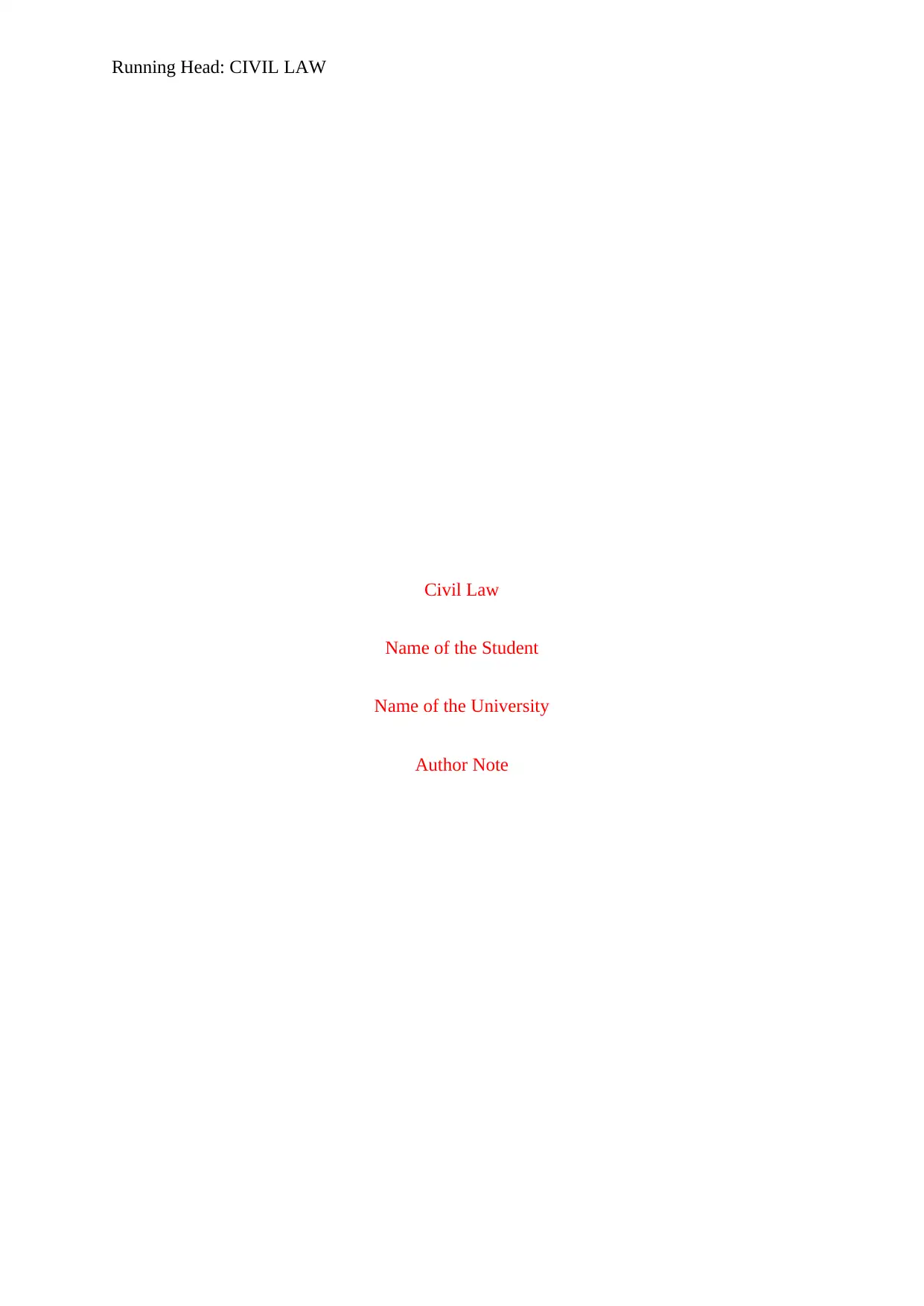
Running Head: CIVIL LAW
Civil Law
Name of the Student
Name of the University
Author Note
Civil Law
Name of the Student
Name of the University
Author Note
Paraphrase This Document
Need a fresh take? Get an instant paraphrase of this document with our AI Paraphraser
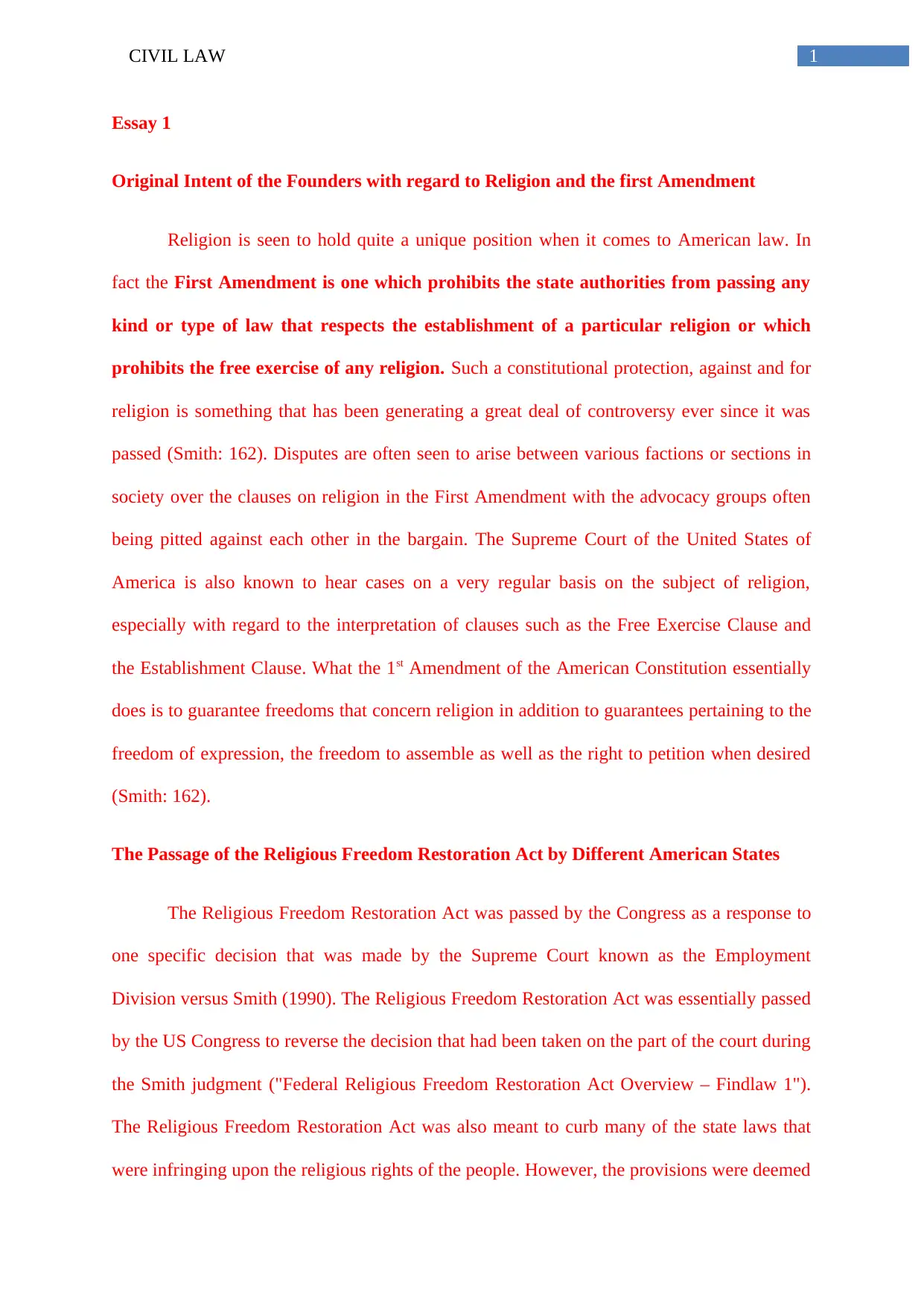
1CIVIL LAW
Essay 1
Original Intent of the Founders with regard to Religion and the first Amendment
Religion is seen to hold quite a unique position when it comes to American law. In
fact the First Amendment is one which prohibits the state authorities from passing any
kind or type of law that respects the establishment of a particular religion or which
prohibits the free exercise of any religion. Such a constitutional protection, against and for
religion is something that has been generating a great deal of controversy ever since it was
passed (Smith: 162). Disputes are often seen to arise between various factions or sections in
society over the clauses on religion in the First Amendment with the advocacy groups often
being pitted against each other in the bargain. The Supreme Court of the United States of
America is also known to hear cases on a very regular basis on the subject of religion,
especially with regard to the interpretation of clauses such as the Free Exercise Clause and
the Establishment Clause. What the 1st Amendment of the American Constitution essentially
does is to guarantee freedoms that concern religion in addition to guarantees pertaining to the
freedom of expression, the freedom to assemble as well as the right to petition when desired
(Smith: 162).
The Passage of the Religious Freedom Restoration Act by Different American States
The Religious Freedom Restoration Act was passed by the Congress as a response to
one specific decision that was made by the Supreme Court known as the Employment
Division versus Smith (1990). The Religious Freedom Restoration Act was essentially passed
by the US Congress to reverse the decision that had been taken on the part of the court during
the Smith judgment ("Federal Religious Freedom Restoration Act Overview – Findlaw 1").
The Religious Freedom Restoration Act was also meant to curb many of the state laws that
were infringing upon the religious rights of the people. However, the provisions were deemed
Essay 1
Original Intent of the Founders with regard to Religion and the first Amendment
Religion is seen to hold quite a unique position when it comes to American law. In
fact the First Amendment is one which prohibits the state authorities from passing any
kind or type of law that respects the establishment of a particular religion or which
prohibits the free exercise of any religion. Such a constitutional protection, against and for
religion is something that has been generating a great deal of controversy ever since it was
passed (Smith: 162). Disputes are often seen to arise between various factions or sections in
society over the clauses on religion in the First Amendment with the advocacy groups often
being pitted against each other in the bargain. The Supreme Court of the United States of
America is also known to hear cases on a very regular basis on the subject of religion,
especially with regard to the interpretation of clauses such as the Free Exercise Clause and
the Establishment Clause. What the 1st Amendment of the American Constitution essentially
does is to guarantee freedoms that concern religion in addition to guarantees pertaining to the
freedom of expression, the freedom to assemble as well as the right to petition when desired
(Smith: 162).
The Passage of the Religious Freedom Restoration Act by Different American States
The Religious Freedom Restoration Act was passed by the Congress as a response to
one specific decision that was made by the Supreme Court known as the Employment
Division versus Smith (1990). The Religious Freedom Restoration Act was essentially passed
by the US Congress to reverse the decision that had been taken on the part of the court during
the Smith judgment ("Federal Religious Freedom Restoration Act Overview – Findlaw 1").
The Religious Freedom Restoration Act was also meant to curb many of the state laws that
were infringing upon the religious rights of the people. However, the provisions were deemed
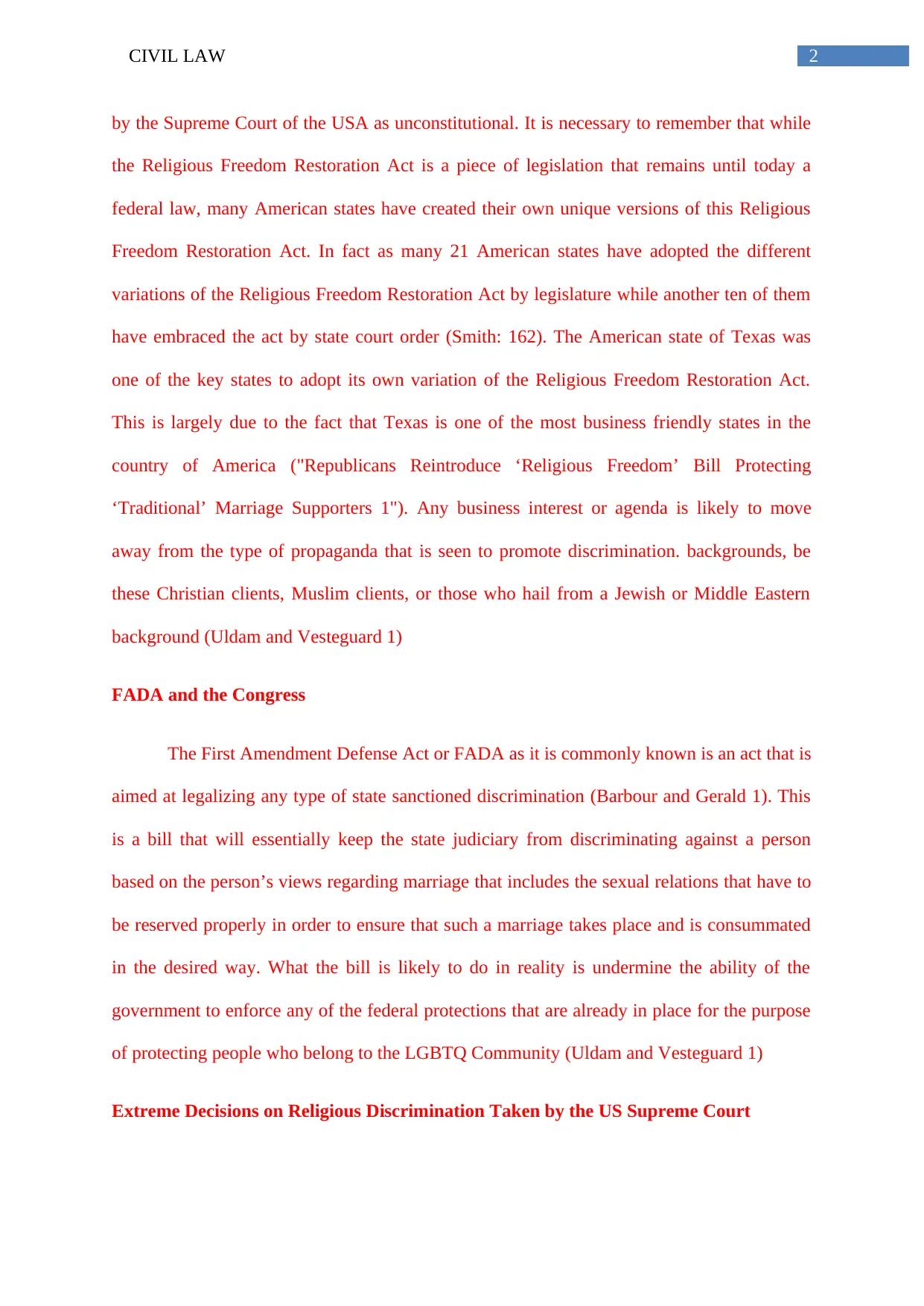
2CIVIL LAW
by the Supreme Court of the USA as unconstitutional. It is necessary to remember that while
the Religious Freedom Restoration Act is a piece of legislation that remains until today a
federal law, many American states have created their own unique versions of this Religious
Freedom Restoration Act. In fact as many 21 American states have adopted the different
variations of the Religious Freedom Restoration Act by legislature while another ten of them
have embraced the act by state court order (Smith: 162). The American state of Texas was
one of the key states to adopt its own variation of the Religious Freedom Restoration Act.
This is largely due to the fact that Texas is one of the most business friendly states in the
country of America ("Republicans Reintroduce ‘Religious Freedom’ Bill Protecting
‘Traditional’ Marriage Supporters 1"). Any business interest or agenda is likely to move
away from the type of propaganda that is seen to promote discrimination. backgrounds, be
these Christian clients, Muslim clients, or those who hail from a Jewish or Middle Eastern
background (Uldam and Vesteguard 1)
FADA and the Congress
The First Amendment Defense Act or FADA as it is commonly known is an act that is
aimed at legalizing any type of state sanctioned discrimination (Barbour and Gerald 1). This
is a bill that will essentially keep the state judiciary from discriminating against a person
based on the person’s views regarding marriage that includes the sexual relations that have to
be reserved properly in order to ensure that such a marriage takes place and is consummated
in the desired way. What the bill is likely to do in reality is undermine the ability of the
government to enforce any of the federal protections that are already in place for the purpose
of protecting people who belong to the LGBTQ Community (Uldam and Vesteguard 1)
Extreme Decisions on Religious Discrimination Taken by the US Supreme Court
by the Supreme Court of the USA as unconstitutional. It is necessary to remember that while
the Religious Freedom Restoration Act is a piece of legislation that remains until today a
federal law, many American states have created their own unique versions of this Religious
Freedom Restoration Act. In fact as many 21 American states have adopted the different
variations of the Religious Freedom Restoration Act by legislature while another ten of them
have embraced the act by state court order (Smith: 162). The American state of Texas was
one of the key states to adopt its own variation of the Religious Freedom Restoration Act.
This is largely due to the fact that Texas is one of the most business friendly states in the
country of America ("Republicans Reintroduce ‘Religious Freedom’ Bill Protecting
‘Traditional’ Marriage Supporters 1"). Any business interest or agenda is likely to move
away from the type of propaganda that is seen to promote discrimination. backgrounds, be
these Christian clients, Muslim clients, or those who hail from a Jewish or Middle Eastern
background (Uldam and Vesteguard 1)
FADA and the Congress
The First Amendment Defense Act or FADA as it is commonly known is an act that is
aimed at legalizing any type of state sanctioned discrimination (Barbour and Gerald 1). This
is a bill that will essentially keep the state judiciary from discriminating against a person
based on the person’s views regarding marriage that includes the sexual relations that have to
be reserved properly in order to ensure that such a marriage takes place and is consummated
in the desired way. What the bill is likely to do in reality is undermine the ability of the
government to enforce any of the federal protections that are already in place for the purpose
of protecting people who belong to the LGBTQ Community (Uldam and Vesteguard 1)
Extreme Decisions on Religious Discrimination Taken by the US Supreme Court
⊘ This is a preview!⊘
Do you want full access?
Subscribe today to unlock all pages.

Trusted by 1+ million students worldwide
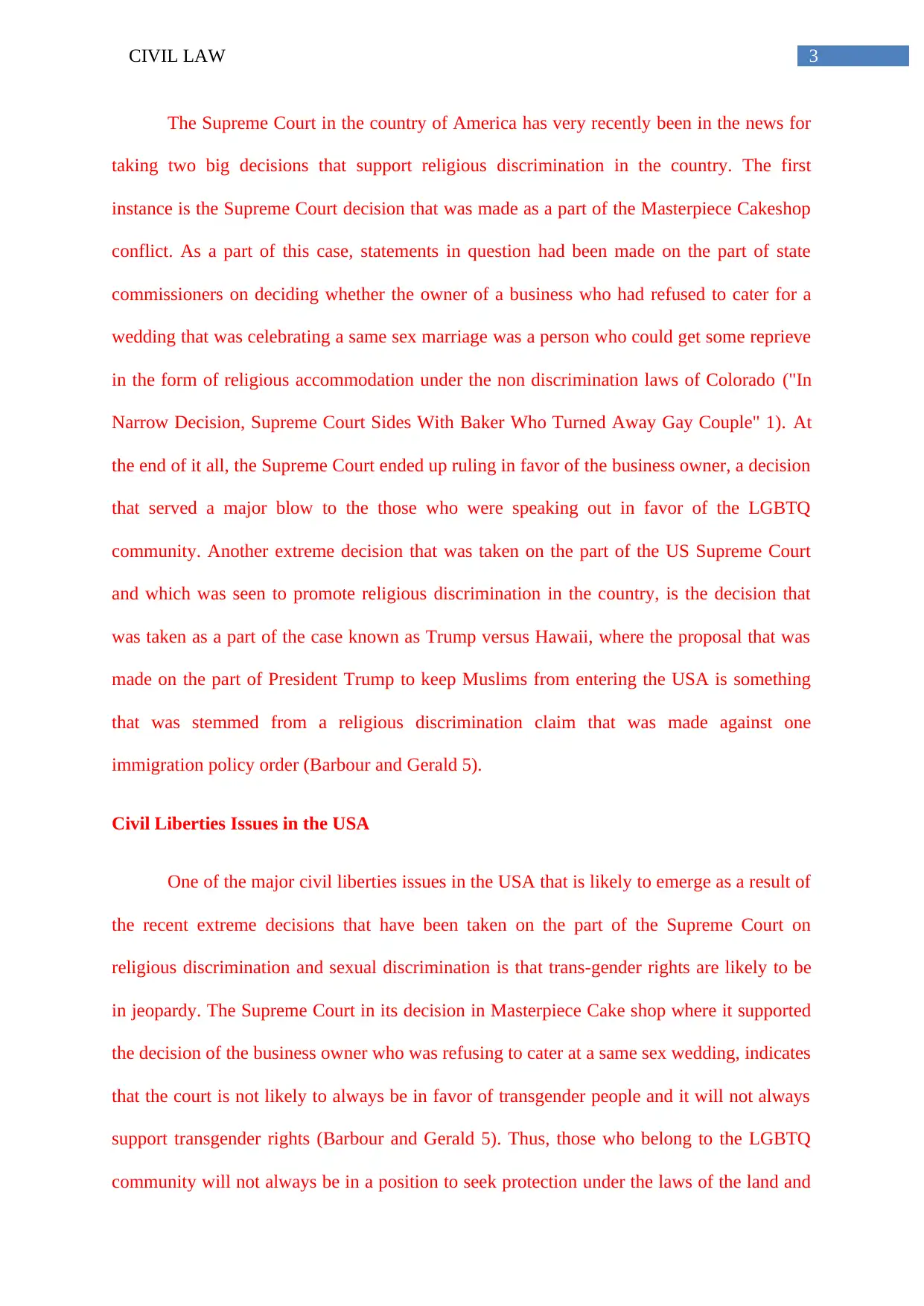
3CIVIL LAW
The Supreme Court in the country of America has very recently been in the news for
taking two big decisions that support religious discrimination in the country. The first
instance is the Supreme Court decision that was made as a part of the Masterpiece Cakeshop
conflict. As a part of this case, statements in question had been made on the part of state
commissioners on deciding whether the owner of a business who had refused to cater for a
wedding that was celebrating a same sex marriage was a person who could get some reprieve
in the form of religious accommodation under the non discrimination laws of Colorado ("In
Narrow Decision, Supreme Court Sides With Baker Who Turned Away Gay Couple" 1). At
the end of it all, the Supreme Court ended up ruling in favor of the business owner, a decision
that served a major blow to the those who were speaking out in favor of the LGBTQ
community. Another extreme decision that was taken on the part of the US Supreme Court
and which was seen to promote religious discrimination in the country, is the decision that
was taken as a part of the case known as Trump versus Hawaii, where the proposal that was
made on the part of President Trump to keep Muslims from entering the USA is something
that was stemmed from a religious discrimination claim that was made against one
immigration policy order (Barbour and Gerald 5).
Civil Liberties Issues in the USA
One of the major civil liberties issues in the USA that is likely to emerge as a result of
the recent extreme decisions that have been taken on the part of the Supreme Court on
religious discrimination and sexual discrimination is that trans-gender rights are likely to be
in jeopardy. The Supreme Court in its decision in Masterpiece Cake shop where it supported
the decision of the business owner who was refusing to cater at a same sex wedding, indicates
that the court is not likely to always be in favor of transgender people and it will not always
support transgender rights (Barbour and Gerald 5). Thus, those who belong to the LGBTQ
community will not always be in a position to seek protection under the laws of the land and
The Supreme Court in the country of America has very recently been in the news for
taking two big decisions that support religious discrimination in the country. The first
instance is the Supreme Court decision that was made as a part of the Masterpiece Cakeshop
conflict. As a part of this case, statements in question had been made on the part of state
commissioners on deciding whether the owner of a business who had refused to cater for a
wedding that was celebrating a same sex marriage was a person who could get some reprieve
in the form of religious accommodation under the non discrimination laws of Colorado ("In
Narrow Decision, Supreme Court Sides With Baker Who Turned Away Gay Couple" 1). At
the end of it all, the Supreme Court ended up ruling in favor of the business owner, a decision
that served a major blow to the those who were speaking out in favor of the LGBTQ
community. Another extreme decision that was taken on the part of the US Supreme Court
and which was seen to promote religious discrimination in the country, is the decision that
was taken as a part of the case known as Trump versus Hawaii, where the proposal that was
made on the part of President Trump to keep Muslims from entering the USA is something
that was stemmed from a religious discrimination claim that was made against one
immigration policy order (Barbour and Gerald 5).
Civil Liberties Issues in the USA
One of the major civil liberties issues in the USA that is likely to emerge as a result of
the recent extreme decisions that have been taken on the part of the Supreme Court on
religious discrimination and sexual discrimination is that trans-gender rights are likely to be
in jeopardy. The Supreme Court in its decision in Masterpiece Cake shop where it supported
the decision of the business owner who was refusing to cater at a same sex wedding, indicates
that the court is not likely to always be in favor of transgender people and it will not always
support transgender rights (Barbour and Gerald 5). Thus, those who belong to the LGBTQ
community will not always be in a position to seek protection under the laws of the land and
Paraphrase This Document
Need a fresh take? Get an instant paraphrase of this document with our AI Paraphraser
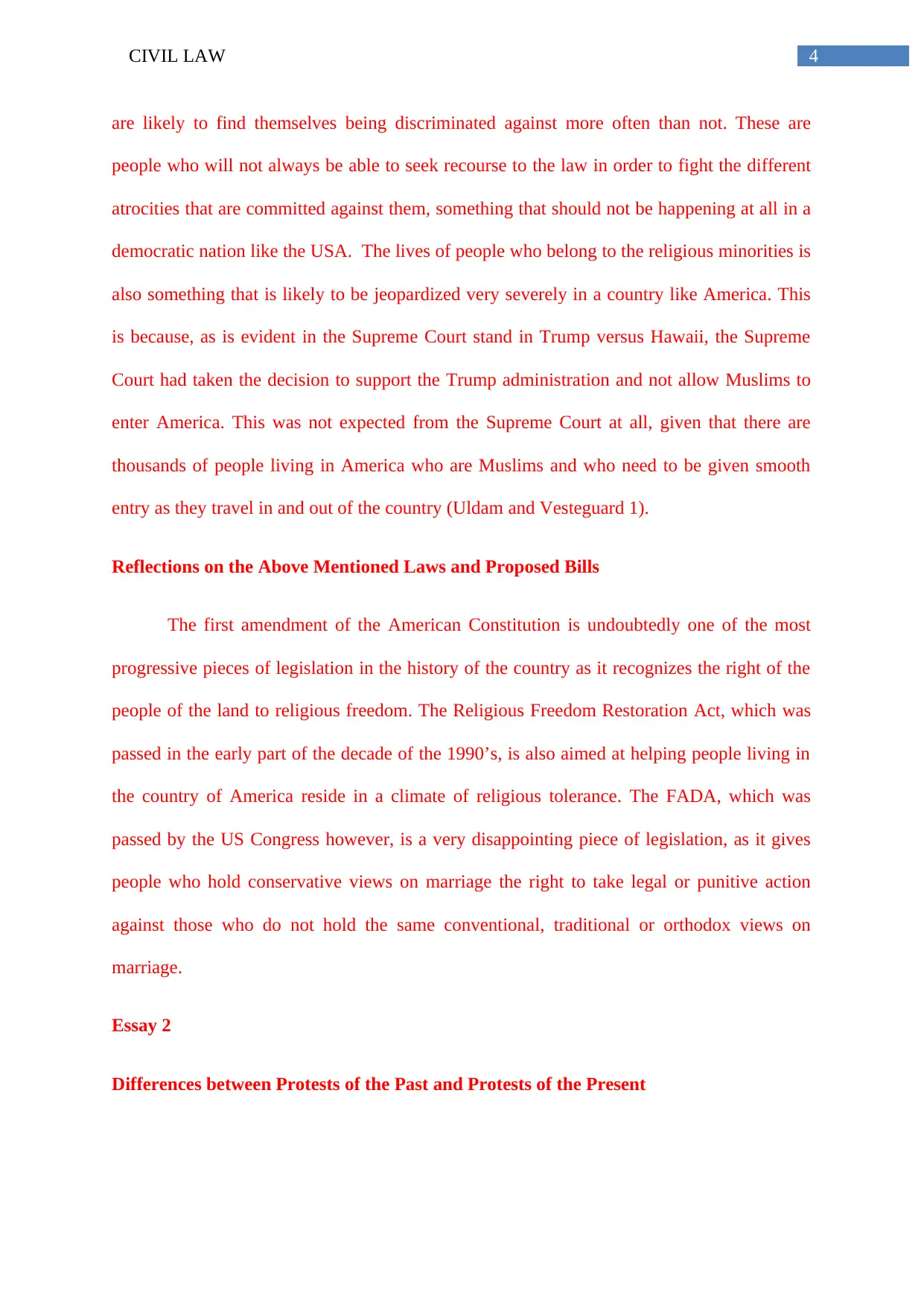
4CIVIL LAW
are likely to find themselves being discriminated against more often than not. These are
people who will not always be able to seek recourse to the law in order to fight the different
atrocities that are committed against them, something that should not be happening at all in a
democratic nation like the USA. The lives of people who belong to the religious minorities is
also something that is likely to be jeopardized very severely in a country like America. This
is because, as is evident in the Supreme Court stand in Trump versus Hawaii, the Supreme
Court had taken the decision to support the Trump administration and not allow Muslims to
enter America. This was not expected from the Supreme Court at all, given that there are
thousands of people living in America who are Muslims and who need to be given smooth
entry as they travel in and out of the country (Uldam and Vesteguard 1).
Reflections on the Above Mentioned Laws and Proposed Bills
The first amendment of the American Constitution is undoubtedly one of the most
progressive pieces of legislation in the history of the country as it recognizes the right of the
people of the land to religious freedom. The Religious Freedom Restoration Act, which was
passed in the early part of the decade of the 1990’s, is also aimed at helping people living in
the country of America reside in a climate of religious tolerance. The FADA, which was
passed by the US Congress however, is a very disappointing piece of legislation, as it gives
people who hold conservative views on marriage the right to take legal or punitive action
against those who do not hold the same conventional, traditional or orthodox views on
marriage.
Essay 2
Differences between Protests of the Past and Protests of the Present
are likely to find themselves being discriminated against more often than not. These are
people who will not always be able to seek recourse to the law in order to fight the different
atrocities that are committed against them, something that should not be happening at all in a
democratic nation like the USA. The lives of people who belong to the religious minorities is
also something that is likely to be jeopardized very severely in a country like America. This
is because, as is evident in the Supreme Court stand in Trump versus Hawaii, the Supreme
Court had taken the decision to support the Trump administration and not allow Muslims to
enter America. This was not expected from the Supreme Court at all, given that there are
thousands of people living in America who are Muslims and who need to be given smooth
entry as they travel in and out of the country (Uldam and Vesteguard 1).
Reflections on the Above Mentioned Laws and Proposed Bills
The first amendment of the American Constitution is undoubtedly one of the most
progressive pieces of legislation in the history of the country as it recognizes the right of the
people of the land to religious freedom. The Religious Freedom Restoration Act, which was
passed in the early part of the decade of the 1990’s, is also aimed at helping people living in
the country of America reside in a climate of religious tolerance. The FADA, which was
passed by the US Congress however, is a very disappointing piece of legislation, as it gives
people who hold conservative views on marriage the right to take legal or punitive action
against those who do not hold the same conventional, traditional or orthodox views on
marriage.
Essay 2
Differences between Protests of the Past and Protests of the Present
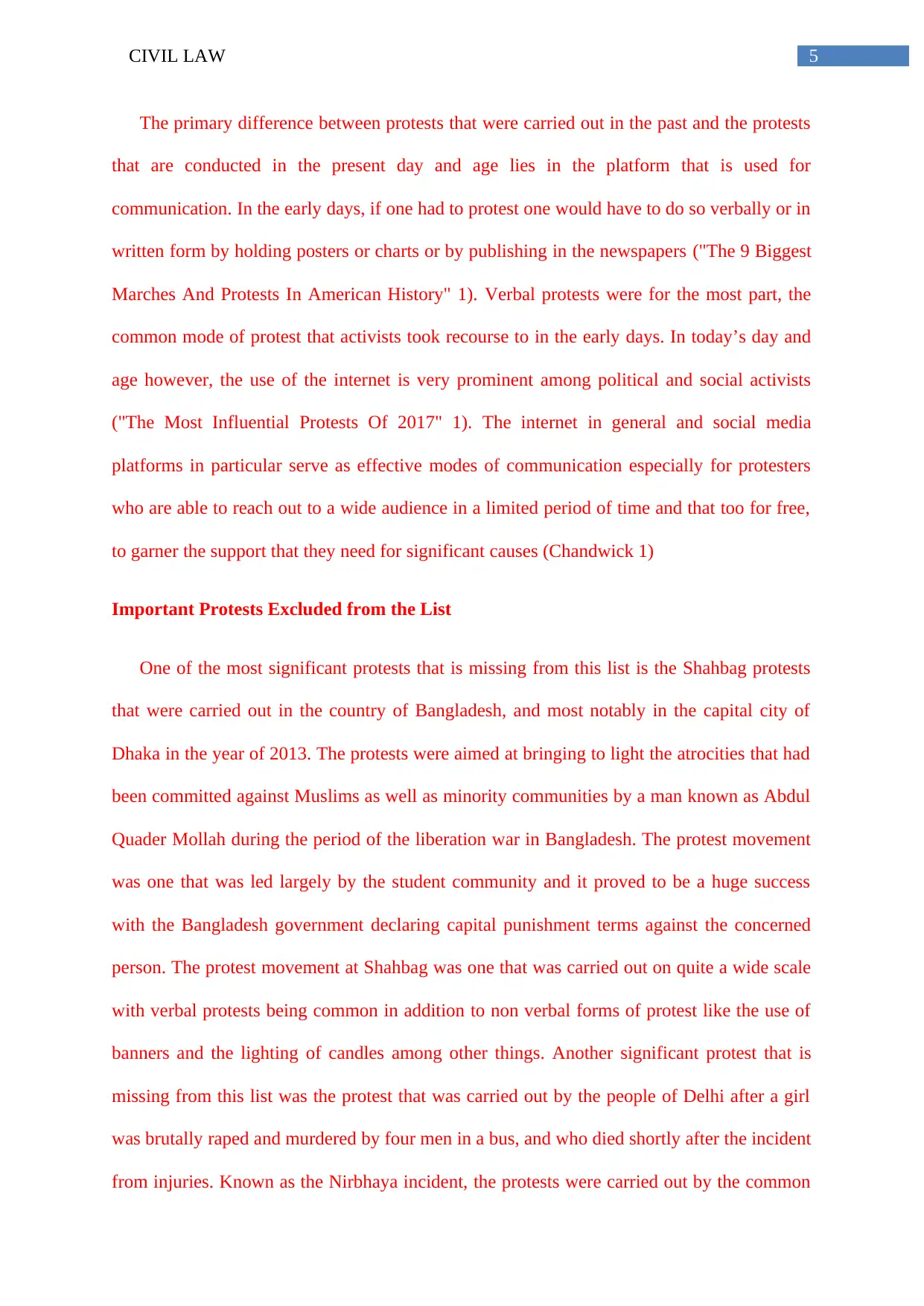
5CIVIL LAW
The primary difference between protests that were carried out in the past and the protests
that are conducted in the present day and age lies in the platform that is used for
communication. In the early days, if one had to protest one would have to do so verbally or in
written form by holding posters or charts or by publishing in the newspapers ("The 9 Biggest
Marches And Protests In American History" 1). Verbal protests were for the most part, the
common mode of protest that activists took recourse to in the early days. In today’s day and
age however, the use of the internet is very prominent among political and social activists
("The Most Influential Protests Of 2017" 1). The internet in general and social media
platforms in particular serve as effective modes of communication especially for protesters
who are able to reach out to a wide audience in a limited period of time and that too for free,
to garner the support that they need for significant causes (Chandwick 1)
Important Protests Excluded from the List
One of the most significant protests that is missing from this list is the Shahbag protests
that were carried out in the country of Bangladesh, and most notably in the capital city of
Dhaka in the year of 2013. The protests were aimed at bringing to light the atrocities that had
been committed against Muslims as well as minority communities by a man known as Abdul
Quader Mollah during the period of the liberation war in Bangladesh. The protest movement
was one that was led largely by the student community and it proved to be a huge success
with the Bangladesh government declaring capital punishment terms against the concerned
person. The protest movement at Shahbag was one that was carried out on quite a wide scale
with verbal protests being common in addition to non verbal forms of protest like the use of
banners and the lighting of candles among other things. Another significant protest that is
missing from this list was the protest that was carried out by the people of Delhi after a girl
was brutally raped and murdered by four men in a bus, and who died shortly after the incident
from injuries. Known as the Nirbhaya incident, the protests were carried out by the common
The primary difference between protests that were carried out in the past and the protests
that are conducted in the present day and age lies in the platform that is used for
communication. In the early days, if one had to protest one would have to do so verbally or in
written form by holding posters or charts or by publishing in the newspapers ("The 9 Biggest
Marches And Protests In American History" 1). Verbal protests were for the most part, the
common mode of protest that activists took recourse to in the early days. In today’s day and
age however, the use of the internet is very prominent among political and social activists
("The Most Influential Protests Of 2017" 1). The internet in general and social media
platforms in particular serve as effective modes of communication especially for protesters
who are able to reach out to a wide audience in a limited period of time and that too for free,
to garner the support that they need for significant causes (Chandwick 1)
Important Protests Excluded from the List
One of the most significant protests that is missing from this list is the Shahbag protests
that were carried out in the country of Bangladesh, and most notably in the capital city of
Dhaka in the year of 2013. The protests were aimed at bringing to light the atrocities that had
been committed against Muslims as well as minority communities by a man known as Abdul
Quader Mollah during the period of the liberation war in Bangladesh. The protest movement
was one that was led largely by the student community and it proved to be a huge success
with the Bangladesh government declaring capital punishment terms against the concerned
person. The protest movement at Shahbag was one that was carried out on quite a wide scale
with verbal protests being common in addition to non verbal forms of protest like the use of
banners and the lighting of candles among other things. Another significant protest that is
missing from this list was the protest that was carried out by the people of Delhi after a girl
was brutally raped and murdered by four men in a bus, and who died shortly after the incident
from injuries. Known as the Nirbhaya incident, the protests were carried out by the common
⊘ This is a preview!⊘
Do you want full access?
Subscribe today to unlock all pages.

Trusted by 1+ million students worldwide
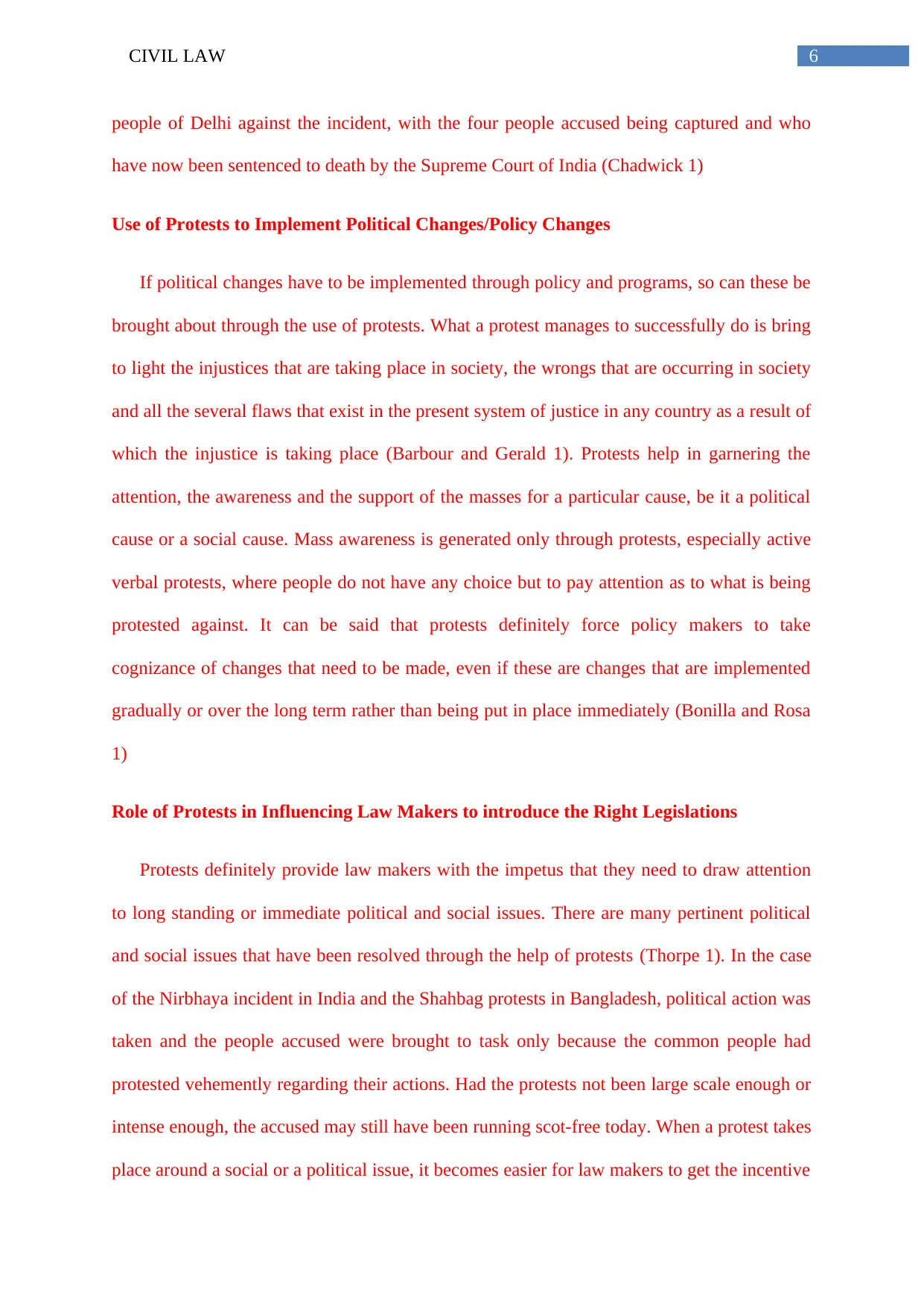
6CIVIL LAW
people of Delhi against the incident, with the four people accused being captured and who
have now been sentenced to death by the Supreme Court of India (Chadwick 1)
Use of Protests to Implement Political Changes/Policy Changes
If political changes have to be implemented through policy and programs, so can these be
brought about through the use of protests. What a protest manages to successfully do is bring
to light the injustices that are taking place in society, the wrongs that are occurring in society
and all the several flaws that exist in the present system of justice in any country as a result of
which the injustice is taking place (Barbour and Gerald 1). Protests help in garnering the
attention, the awareness and the support of the masses for a particular cause, be it a political
cause or a social cause. Mass awareness is generated only through protests, especially active
verbal protests, where people do not have any choice but to pay attention as to what is being
protested against. It can be said that protests definitely force policy makers to take
cognizance of changes that need to be made, even if these are changes that are implemented
gradually or over the long term rather than being put in place immediately (Bonilla and Rosa
1)
Role of Protests in Influencing Law Makers to introduce the Right Legislations
Protests definitely provide law makers with the impetus that they need to draw attention
to long standing or immediate political and social issues. There are many pertinent political
and social issues that have been resolved through the help of protests (Thorpe 1). In the case
of the Nirbhaya incident in India and the Shahbag protests in Bangladesh, political action was
taken and the people accused were brought to task only because the common people had
protested vehemently regarding their actions. Had the protests not been large scale enough or
intense enough, the accused may still have been running scot-free today. When a protest takes
place around a social or a political issue, it becomes easier for law makers to get the incentive
people of Delhi against the incident, with the four people accused being captured and who
have now been sentenced to death by the Supreme Court of India (Chadwick 1)
Use of Protests to Implement Political Changes/Policy Changes
If political changes have to be implemented through policy and programs, so can these be
brought about through the use of protests. What a protest manages to successfully do is bring
to light the injustices that are taking place in society, the wrongs that are occurring in society
and all the several flaws that exist in the present system of justice in any country as a result of
which the injustice is taking place (Barbour and Gerald 1). Protests help in garnering the
attention, the awareness and the support of the masses for a particular cause, be it a political
cause or a social cause. Mass awareness is generated only through protests, especially active
verbal protests, where people do not have any choice but to pay attention as to what is being
protested against. It can be said that protests definitely force policy makers to take
cognizance of changes that need to be made, even if these are changes that are implemented
gradually or over the long term rather than being put in place immediately (Bonilla and Rosa
1)
Role of Protests in Influencing Law Makers to introduce the Right Legislations
Protests definitely provide law makers with the impetus that they need to draw attention
to long standing or immediate political and social issues. There are many pertinent political
and social issues that have been resolved through the help of protests (Thorpe 1). In the case
of the Nirbhaya incident in India and the Shahbag protests in Bangladesh, political action was
taken and the people accused were brought to task only because the common people had
protested vehemently regarding their actions. Had the protests not been large scale enough or
intense enough, the accused may still have been running scot-free today. When a protest takes
place around a social or a political issue, it becomes easier for law makers to get the incentive
Paraphrase This Document
Need a fresh take? Get an instant paraphrase of this document with our AI Paraphraser
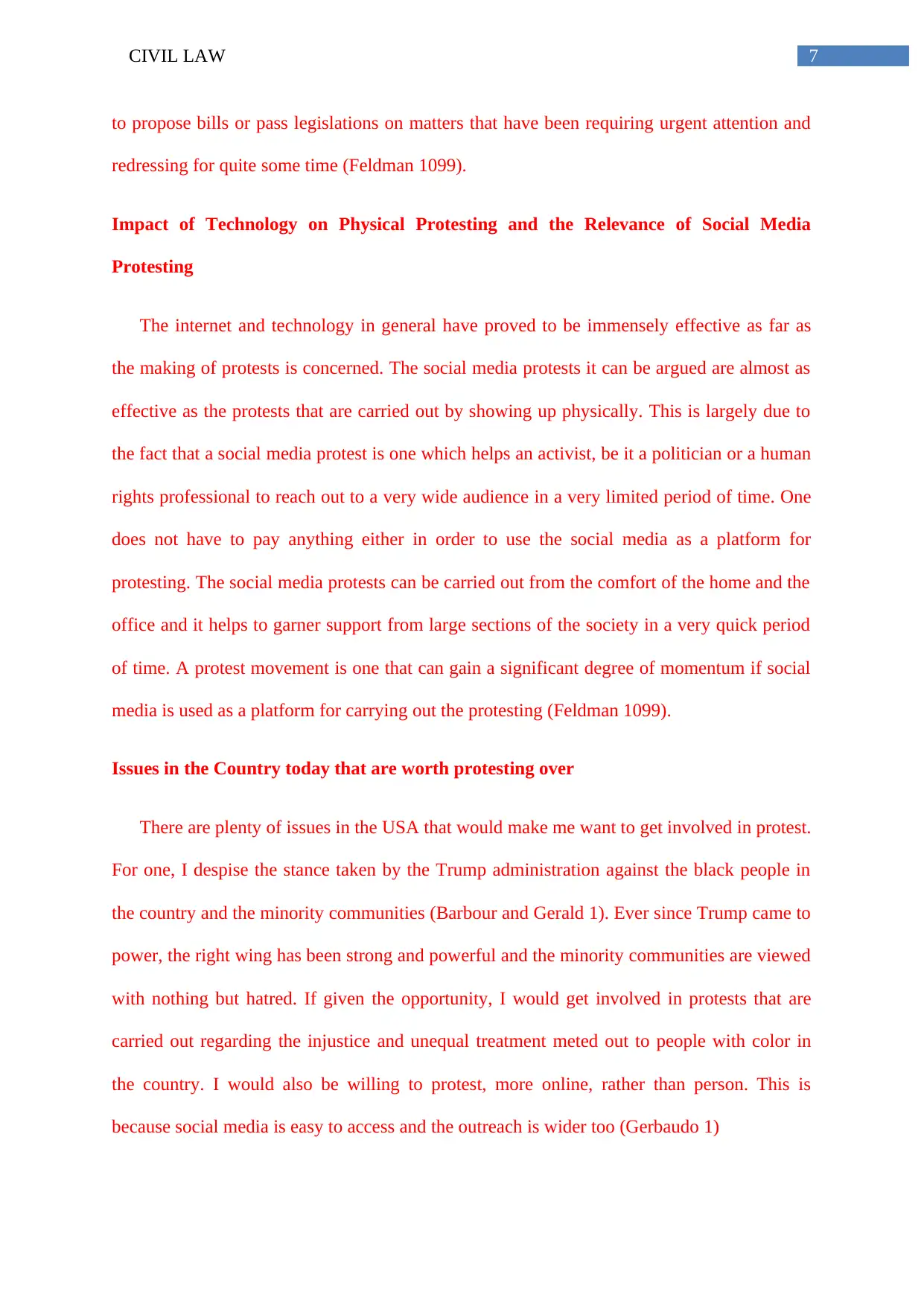
7CIVIL LAW
to propose bills or pass legislations on matters that have been requiring urgent attention and
redressing for quite some time (Feldman 1099).
Impact of Technology on Physical Protesting and the Relevance of Social Media
Protesting
The internet and technology in general have proved to be immensely effective as far as
the making of protests is concerned. The social media protests it can be argued are almost as
effective as the protests that are carried out by showing up physically. This is largely due to
the fact that a social media protest is one which helps an activist, be it a politician or a human
rights professional to reach out to a very wide audience in a very limited period of time. One
does not have to pay anything either in order to use the social media as a platform for
protesting. The social media protests can be carried out from the comfort of the home and the
office and it helps to garner support from large sections of the society in a very quick period
of time. A protest movement is one that can gain a significant degree of momentum if social
media is used as a platform for carrying out the protesting (Feldman 1099).
Issues in the Country today that are worth protesting over
There are plenty of issues in the USA that would make me want to get involved in protest.
For one, I despise the stance taken by the Trump administration against the black people in
the country and the minority communities (Barbour and Gerald 1). Ever since Trump came to
power, the right wing has been strong and powerful and the minority communities are viewed
with nothing but hatred. If given the opportunity, I would get involved in protests that are
carried out regarding the injustice and unequal treatment meted out to people with color in
the country. I would also be willing to protest, more online, rather than person. This is
because social media is easy to access and the outreach is wider too (Gerbaudo 1)
to propose bills or pass legislations on matters that have been requiring urgent attention and
redressing for quite some time (Feldman 1099).
Impact of Technology on Physical Protesting and the Relevance of Social Media
Protesting
The internet and technology in general have proved to be immensely effective as far as
the making of protests is concerned. The social media protests it can be argued are almost as
effective as the protests that are carried out by showing up physically. This is largely due to
the fact that a social media protest is one which helps an activist, be it a politician or a human
rights professional to reach out to a very wide audience in a very limited period of time. One
does not have to pay anything either in order to use the social media as a platform for
protesting. The social media protests can be carried out from the comfort of the home and the
office and it helps to garner support from large sections of the society in a very quick period
of time. A protest movement is one that can gain a significant degree of momentum if social
media is used as a platform for carrying out the protesting (Feldman 1099).
Issues in the Country today that are worth protesting over
There are plenty of issues in the USA that would make me want to get involved in protest.
For one, I despise the stance taken by the Trump administration against the black people in
the country and the minority communities (Barbour and Gerald 1). Ever since Trump came to
power, the right wing has been strong and powerful and the minority communities are viewed
with nothing but hatred. If given the opportunity, I would get involved in protests that are
carried out regarding the injustice and unequal treatment meted out to people with color in
the country. I would also be willing to protest, more online, rather than person. This is
because social media is easy to access and the outreach is wider too (Gerbaudo 1)
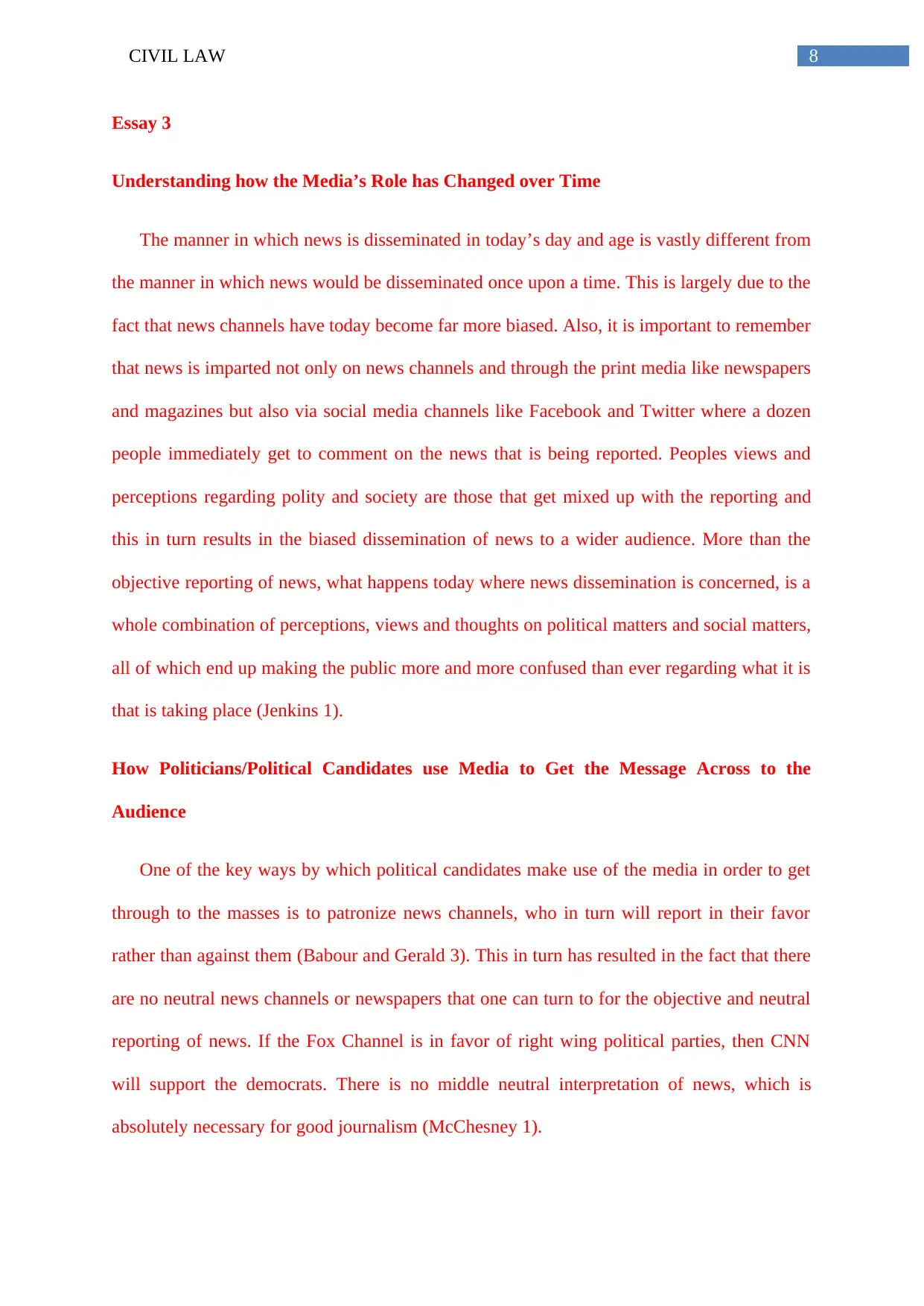
8CIVIL LAW
Essay 3
Understanding how the Media’s Role has Changed over Time
The manner in which news is disseminated in today’s day and age is vastly different from
the manner in which news would be disseminated once upon a time. This is largely due to the
fact that news channels have today become far more biased. Also, it is important to remember
that news is imparted not only on news channels and through the print media like newspapers
and magazines but also via social media channels like Facebook and Twitter where a dozen
people immediately get to comment on the news that is being reported. Peoples views and
perceptions regarding polity and society are those that get mixed up with the reporting and
this in turn results in the biased dissemination of news to a wider audience. More than the
objective reporting of news, what happens today where news dissemination is concerned, is a
whole combination of perceptions, views and thoughts on political matters and social matters,
all of which end up making the public more and more confused than ever regarding what it is
that is taking place (Jenkins 1).
How Politicians/Political Candidates use Media to Get the Message Across to the
Audience
One of the key ways by which political candidates make use of the media in order to get
through to the masses is to patronize news channels, who in turn will report in their favor
rather than against them (Babour and Gerald 3). This in turn has resulted in the fact that there
are no neutral news channels or newspapers that one can turn to for the objective and neutral
reporting of news. If the Fox Channel is in favor of right wing political parties, then CNN
will support the democrats. There is no middle neutral interpretation of news, which is
absolutely necessary for good journalism (McChesney 1).
Essay 3
Understanding how the Media’s Role has Changed over Time
The manner in which news is disseminated in today’s day and age is vastly different from
the manner in which news would be disseminated once upon a time. This is largely due to the
fact that news channels have today become far more biased. Also, it is important to remember
that news is imparted not only on news channels and through the print media like newspapers
and magazines but also via social media channels like Facebook and Twitter where a dozen
people immediately get to comment on the news that is being reported. Peoples views and
perceptions regarding polity and society are those that get mixed up with the reporting and
this in turn results in the biased dissemination of news to a wider audience. More than the
objective reporting of news, what happens today where news dissemination is concerned, is a
whole combination of perceptions, views and thoughts on political matters and social matters,
all of which end up making the public more and more confused than ever regarding what it is
that is taking place (Jenkins 1).
How Politicians/Political Candidates use Media to Get the Message Across to the
Audience
One of the key ways by which political candidates make use of the media in order to get
through to the masses is to patronize news channels, who in turn will report in their favor
rather than against them (Babour and Gerald 3). This in turn has resulted in the fact that there
are no neutral news channels or newspapers that one can turn to for the objective and neutral
reporting of news. If the Fox Channel is in favor of right wing political parties, then CNN
will support the democrats. There is no middle neutral interpretation of news, which is
absolutely necessary for good journalism (McChesney 1).
⊘ This is a preview!⊘
Do you want full access?
Subscribe today to unlock all pages.

Trusted by 1+ million students worldwide
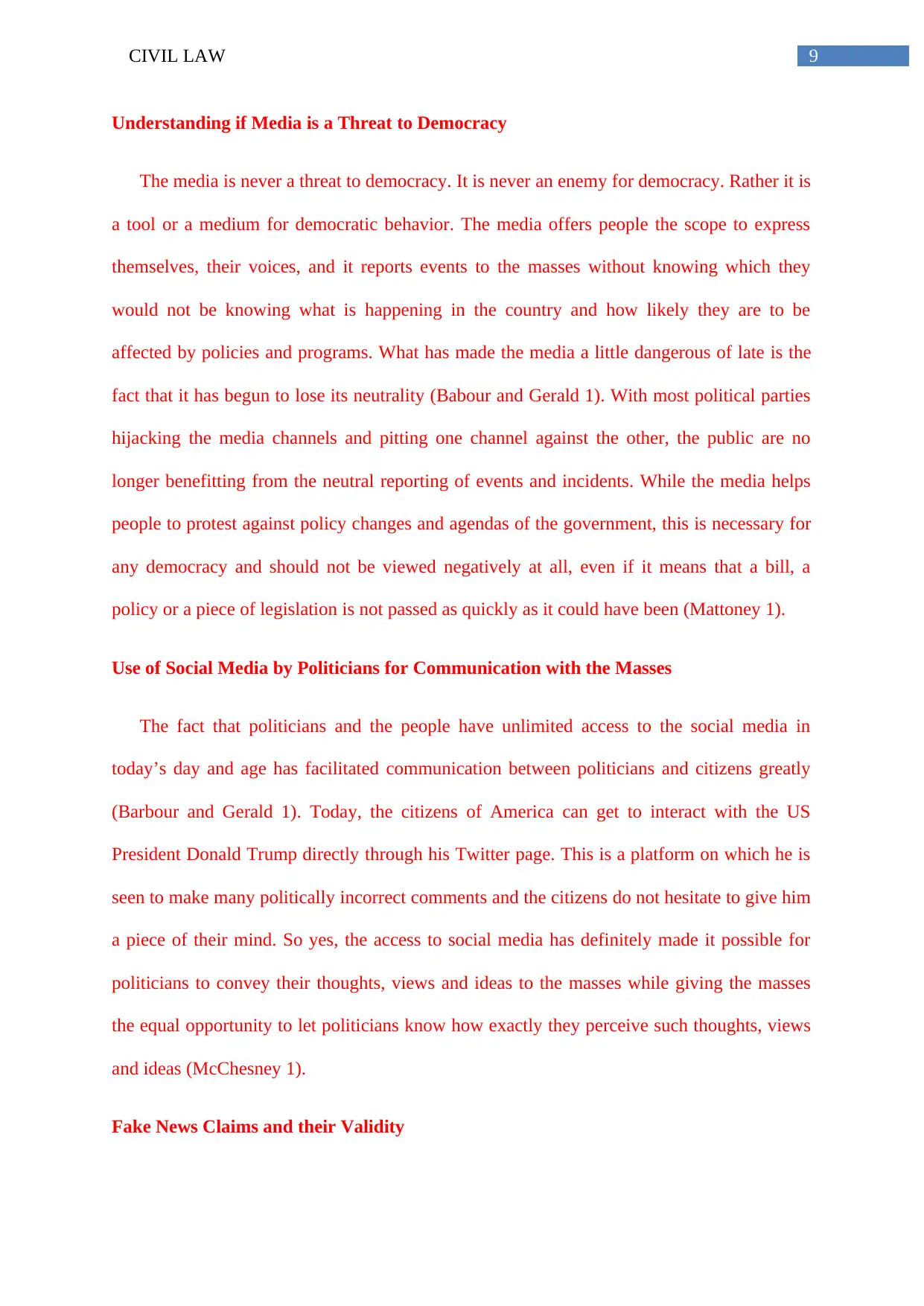
9CIVIL LAW
Understanding if Media is a Threat to Democracy
The media is never a threat to democracy. It is never an enemy for democracy. Rather it is
a tool or a medium for democratic behavior. The media offers people the scope to express
themselves, their voices, and it reports events to the masses without knowing which they
would not be knowing what is happening in the country and how likely they are to be
affected by policies and programs. What has made the media a little dangerous of late is the
fact that it has begun to lose its neutrality (Babour and Gerald 1). With most political parties
hijacking the media channels and pitting one channel against the other, the public are no
longer benefitting from the neutral reporting of events and incidents. While the media helps
people to protest against policy changes and agendas of the government, this is necessary for
any democracy and should not be viewed negatively at all, even if it means that a bill, a
policy or a piece of legislation is not passed as quickly as it could have been (Mattoney 1).
Use of Social Media by Politicians for Communication with the Masses
The fact that politicians and the people have unlimited access to the social media in
today’s day and age has facilitated communication between politicians and citizens greatly
(Barbour and Gerald 1). Today, the citizens of America can get to interact with the US
President Donald Trump directly through his Twitter page. This is a platform on which he is
seen to make many politically incorrect comments and the citizens do not hesitate to give him
a piece of their mind. So yes, the access to social media has definitely made it possible for
politicians to convey their thoughts, views and ideas to the masses while giving the masses
the equal opportunity to let politicians know how exactly they perceive such thoughts, views
and ideas (McChesney 1).
Fake News Claims and their Validity
Understanding if Media is a Threat to Democracy
The media is never a threat to democracy. It is never an enemy for democracy. Rather it is
a tool or a medium for democratic behavior. The media offers people the scope to express
themselves, their voices, and it reports events to the masses without knowing which they
would not be knowing what is happening in the country and how likely they are to be
affected by policies and programs. What has made the media a little dangerous of late is the
fact that it has begun to lose its neutrality (Babour and Gerald 1). With most political parties
hijacking the media channels and pitting one channel against the other, the public are no
longer benefitting from the neutral reporting of events and incidents. While the media helps
people to protest against policy changes and agendas of the government, this is necessary for
any democracy and should not be viewed negatively at all, even if it means that a bill, a
policy or a piece of legislation is not passed as quickly as it could have been (Mattoney 1).
Use of Social Media by Politicians for Communication with the Masses
The fact that politicians and the people have unlimited access to the social media in
today’s day and age has facilitated communication between politicians and citizens greatly
(Barbour and Gerald 1). Today, the citizens of America can get to interact with the US
President Donald Trump directly through his Twitter page. This is a platform on which he is
seen to make many politically incorrect comments and the citizens do not hesitate to give him
a piece of their mind. So yes, the access to social media has definitely made it possible for
politicians to convey their thoughts, views and ideas to the masses while giving the masses
the equal opportunity to let politicians know how exactly they perceive such thoughts, views
and ideas (McChesney 1).
Fake News Claims and their Validity
Paraphrase This Document
Need a fresh take? Get an instant paraphrase of this document with our AI Paraphraser
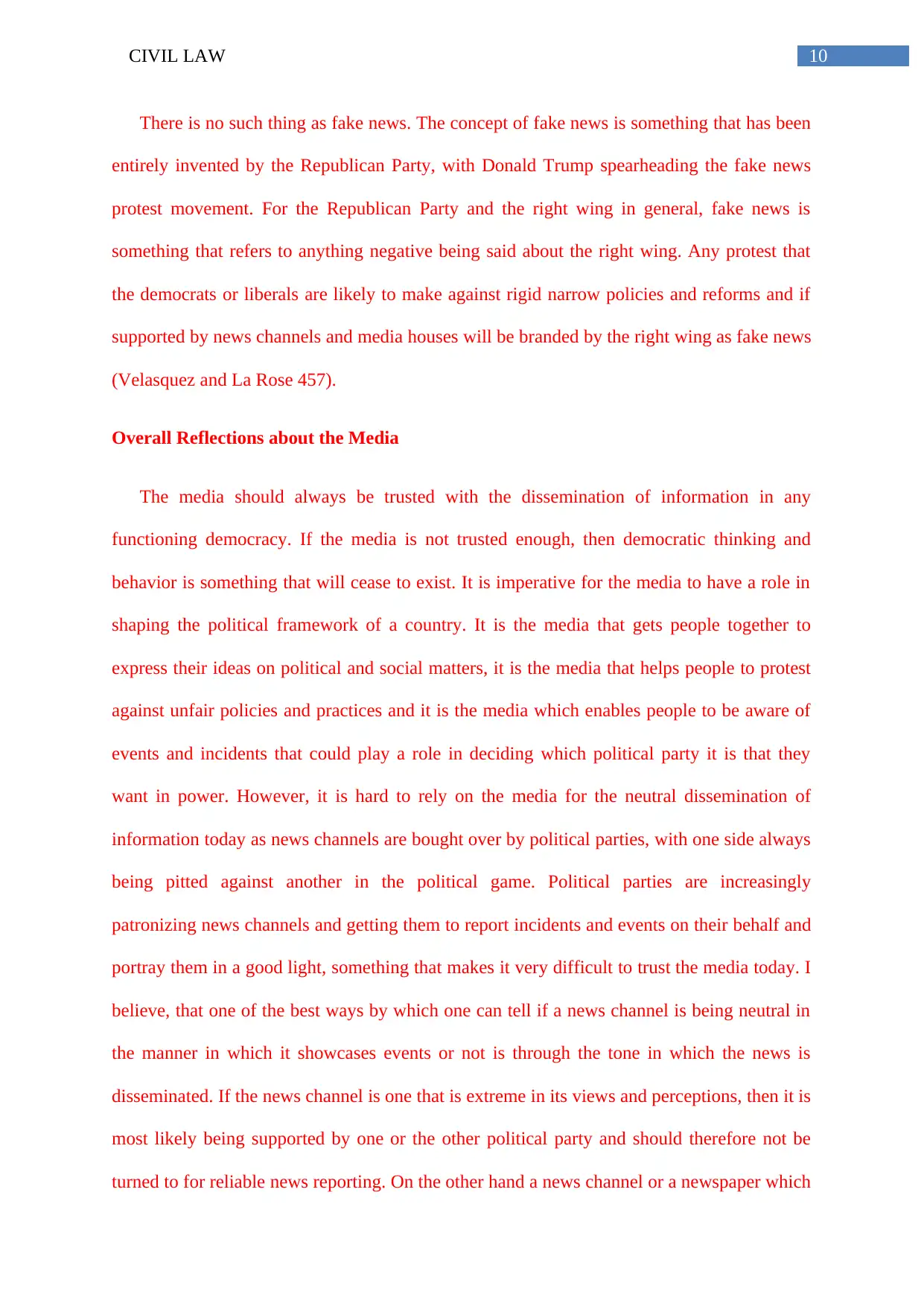
10CIVIL LAW
There is no such thing as fake news. The concept of fake news is something that has been
entirely invented by the Republican Party, with Donald Trump spearheading the fake news
protest movement. For the Republican Party and the right wing in general, fake news is
something that refers to anything negative being said about the right wing. Any protest that
the democrats or liberals are likely to make against rigid narrow policies and reforms and if
supported by news channels and media houses will be branded by the right wing as fake news
(Velasquez and La Rose 457).
Overall Reflections about the Media
The media should always be trusted with the dissemination of information in any
functioning democracy. If the media is not trusted enough, then democratic thinking and
behavior is something that will cease to exist. It is imperative for the media to have a role in
shaping the political framework of a country. It is the media that gets people together to
express their ideas on political and social matters, it is the media that helps people to protest
against unfair policies and practices and it is the media which enables people to be aware of
events and incidents that could play a role in deciding which political party it is that they
want in power. However, it is hard to rely on the media for the neutral dissemination of
information today as news channels are bought over by political parties, with one side always
being pitted against another in the political game. Political parties are increasingly
patronizing news channels and getting them to report incidents and events on their behalf and
portray them in a good light, something that makes it very difficult to trust the media today. I
believe, that one of the best ways by which one can tell if a news channel is being neutral in
the manner in which it showcases events or not is through the tone in which the news is
disseminated. If the news channel is one that is extreme in its views and perceptions, then it is
most likely being supported by one or the other political party and should therefore not be
turned to for reliable news reporting. On the other hand a news channel or a newspaper which
There is no such thing as fake news. The concept of fake news is something that has been
entirely invented by the Republican Party, with Donald Trump spearheading the fake news
protest movement. For the Republican Party and the right wing in general, fake news is
something that refers to anything negative being said about the right wing. Any protest that
the democrats or liberals are likely to make against rigid narrow policies and reforms and if
supported by news channels and media houses will be branded by the right wing as fake news
(Velasquez and La Rose 457).
Overall Reflections about the Media
The media should always be trusted with the dissemination of information in any
functioning democracy. If the media is not trusted enough, then democratic thinking and
behavior is something that will cease to exist. It is imperative for the media to have a role in
shaping the political framework of a country. It is the media that gets people together to
express their ideas on political and social matters, it is the media that helps people to protest
against unfair policies and practices and it is the media which enables people to be aware of
events and incidents that could play a role in deciding which political party it is that they
want in power. However, it is hard to rely on the media for the neutral dissemination of
information today as news channels are bought over by political parties, with one side always
being pitted against another in the political game. Political parties are increasingly
patronizing news channels and getting them to report incidents and events on their behalf and
portray them in a good light, something that makes it very difficult to trust the media today. I
believe, that one of the best ways by which one can tell if a news channel is being neutral in
the manner in which it showcases events or not is through the tone in which the news is
disseminated. If the news channel is one that is extreme in its views and perceptions, then it is
most likely being supported by one or the other political party and should therefore not be
turned to for reliable news reporting. On the other hand a news channel or a newspaper which

11CIVIL LAW
reports incidents in a way that all segments of the polity are critiqued and there is no effort
made on the part of the channel or the newspaper to favor one party and criticize another,
then only can the news be trusted or relied upon (Velasquez and La Rose 456).
reports incidents in a way that all segments of the polity are critiqued and there is no effort
made on the part of the channel or the newspaper to favor one party and criticize another,
then only can the news be trusted or relied upon (Velasquez and La Rose 456).
⊘ This is a preview!⊘
Do you want full access?
Subscribe today to unlock all pages.

Trusted by 1+ million students worldwide
1 out of 15
Related Documents
Your All-in-One AI-Powered Toolkit for Academic Success.
+13062052269
info@desklib.com
Available 24*7 on WhatsApp / Email
![[object Object]](/_next/static/media/star-bottom.7253800d.svg)
Unlock your academic potential
Copyright © 2020–2026 A2Z Services. All Rights Reserved. Developed and managed by ZUCOL.





